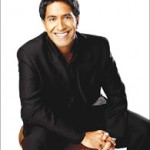Sanjay Gupta, MD, assistant professor of neurosurgery at Emory School of Medicine and associate chief of neurosurgery service at Grady Memorial Hospital, navigates a busy schedule as a practicing doctor and the internationally known face of health reporting for CNN.

Sanjay Gupta, MD
Next week, on Nov. 18, Gupta shares his story and discusses his new book at a book signing event at Emory. His book is titled “Cheating Death: The Doctors and Medical Miracles that Are Saving Lives Against All Odds.â€
In a recent article, Emory Magazine profiles Gupta and remarkable journey:
- Gupta can barely disguise the wonder he still feels when he ponders the complex circuitry of the human brain. And he can barely contain the wonder he feels when he is called upon to care for a patient, the way he saw doctors care for his grandfather.
- “I love the intellectual challenge of it. I love the technical challenge of it. But at the end of the day—if someone comes in with a tumor or some kind of chronic pain issue that I can help in some way—that’s a remarkable feeling,†he says. “I operated all day Monday, and I walked home and told my wife all about my day, and it’s one of the most satisfying things I can do.â€
-

Gupta reports from the field
Barely sixteen when he was accepted into an accelerated program to enter medical school, Gupta fast-tracked his career along parallel yet complementary paths. He wanted to be a great doctor and a great communicator. He wanted to heal patients, and he wanted to hear them.
- Those interests synthesized when he joined CNN as its chief medical correspondent. With his straightforward yet reassuring manner, he has become the nation’s calm voice of medical reason—a doctor who possesses the rare ability to talk to the camera as if he were talking to a patient. He speaks, and somehow we believe he wouldn’t mind taking all the time in the world to help us separate facts from fears.
Read more about Gupta in Emory Magazine. Learn more about Gupta’s book signing event. For stories from Gupta on the road, visit here.
Posted on
November 10, 2009 by
admin
in Uncategorized







